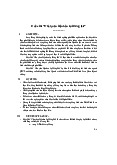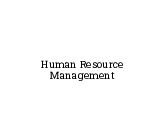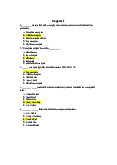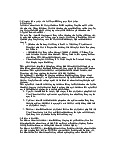



















Preview text:
Human Resource Management CHAPTER 1 Introduction to Human Resource Management Learning objectives
• Managing Human Resource Today - What is HR Management -
Why Is Human Resource Management Important to All Managers? -
The trends shaping HR Management
• Managing Equal Opportunity and Diversity Managing Human Resource Today • What is Management? •Control •Organize Management •Lead •Plan •Staff • What is Management?
• Planning: Establishing goals and standards; developing rules and procedures; developing plans and forecasts.
• Organizing: Giving each subordinate a specific task; establishing departments; delegating
authority to subordinates; establishing channels of authority and communication; coordinating the work of subordinates.
• Leading: Getting others to get the job done; maintaining morale; motivating subordinates.
• Controlling: Setting standards such as sales quotas, quality standards, or production levels;
checking to see how actual performance compares with these standards; taking corrective action as needed.
• Staffing: Determining what type of people should be hired; recruiting prospective employees;
selecting employees; training and developing employees; setting performance standards;
evaluating performance; compensating employees; counseling employees.
• What is Human Resource Management? -
Human Resource Management (HRM) is the process of acquiring, training, appraising, and compensating
employees, and of attending to their labor
relations, health and safety, and fairness concerns. (Dessler, 2020).
What is HRM important to Managers?
=> HRM is important to managers since it helps them to avoid some of the personnel mistakes:
• Have your employees not doing their best
• Hire the wrong person for the job • Experience high turnover
• Have your company in court due to your discriminatory actions
• Have your company cited for unsafe practices
• Let a lack of training undermine your department’s effectiveness
• Commit any unfair labor practices
Line and Staff aspects of Human Resource Management
HR managers’ duties are different from those of line managers.
It is the difference between line authority and staff authority.
• Authority: is the right to make decisions and give orders.
• Line authority: is the authority of managers to direct people in their department.
• Staff authority: gives the HR manager the right to
advise other managers or employees.
Line Managers’ Human Resource Management Responsibilities -
Place the right person on the right job - Orientate new employees - Train employees - Improve the job performance -
Develop good working relationships among employees -
Interpret the company’s policies and procedures - Control costs - Develop staff’s abilities -
Protect staff’s health and physical condition • HR Manager’s Duties Functions of an HR Manager Coordination Staff Line function function function Advise and assist CEO Coordinates HR activities Direct activities in own and other managers to and HR-related issues department understand HR issues Have staff authority over other departments in employment related-issues




